The Caledonia yawl in my back yard was covered with a heavy frost this morning and all of the varnished ash had been turned from amber to silvery white. In the afternoon, when the I draped a tarp over the boat to protect it, I was daydreaming about waking up to a heavy frost after spending the night at anchor.
It has taken me a while to appreciate the cold. Before I took to adventures in small boats, my focus was on backpacking. It started as a summer activity with my father and older sister when I was about 10 and became a solo pursuit when I was 18. I kept increasing the challenge of wilderness travel, first by stretching the distances and later by shifting, by degrees, from summer to winter. In 1997, my friend Mark and I snowshoed across the Cascade mountain range. I have a vivid, lasting memory of getting up in the middle of the night for a pee break and seeing the light from my headlamp being reflected as thousands of flickers of light, brighter than anything I’d seen reflected by snow. During the night ice crystals had grown up from the surface of the snow, each like a hexagonal golf tee of crystal, some over 2” tall, and their cupped tops reflected the light back to me. The crystalline pillars would fall over with the slightest touch—even a breath could send them knocking others over like dominoes.
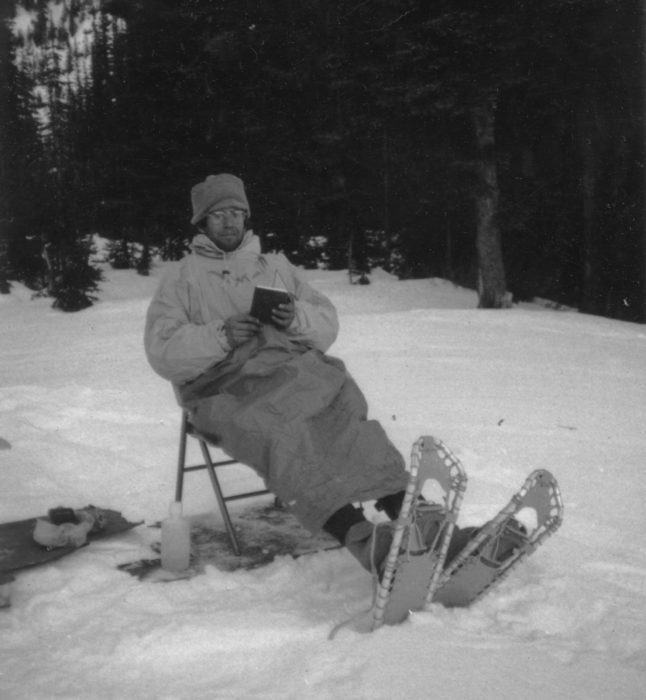
Deep in the woods, Mark and I found a trail maintenance shed that made a comfortable camp. The shin-length cagoule and foam-insulated booties I’d made kept me toasty warm.
I ultimately graduated to winter solo hikes and carried a heavy pack to a frozen alpine lake where I spent the first night in my tent, and the rest of the time in an igloo I made the following day. My boating took a similar trajectory, starting with summer cruises and drifting toward winter.
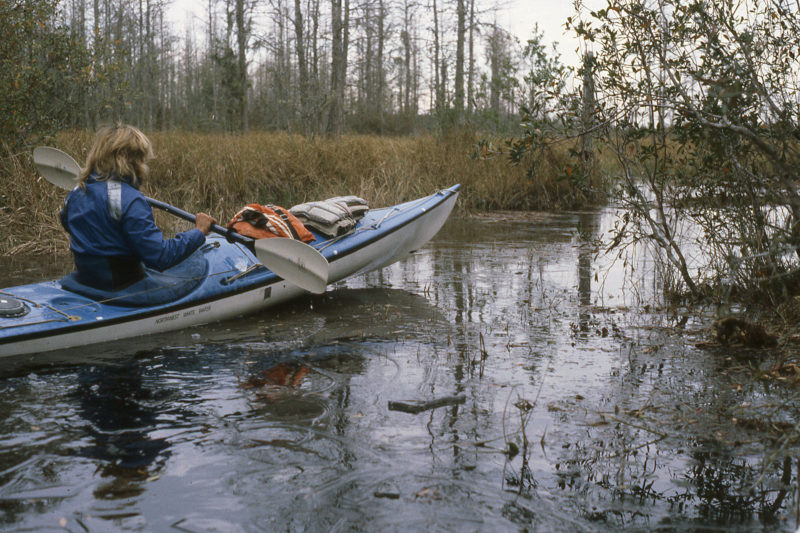
It was slow going in the Okefenokee Swamp, where temperatures were in the teens the water trails were barricaded with ice.
Paddling the East Coast from north to south, starting in September 1983, was intended to stay in autumn and keep pace with the migration of the cold weather that would clear alligators, snakes, and biting insects from our path. That strategy worked well until we reached Florida, when a cold front caught up with us. The St. Marys River was fringed with ice and parts of the Okefenokee swamp were frozen over. My paddling partner’s kayak had a long, overhanging bow, so she got the icebreaking duties. She’d sprint at the ice and ride up over it until the ice collapsed under the weight. We were free of the ice by the time we reached the Suwannee River, but it was still bitterly cold. We’d learned about “fat lighter” wood from the locals, so we’d camp where there were pine logs and stumps that had rotted away, leaving the resin-saturated heartwood. Even sticks that I pulled out of the river water would light and burn. The wood bubbled black resin as it burned and made hot, long-lasting fires that would hold the cold back until we were in our sleeping bags.
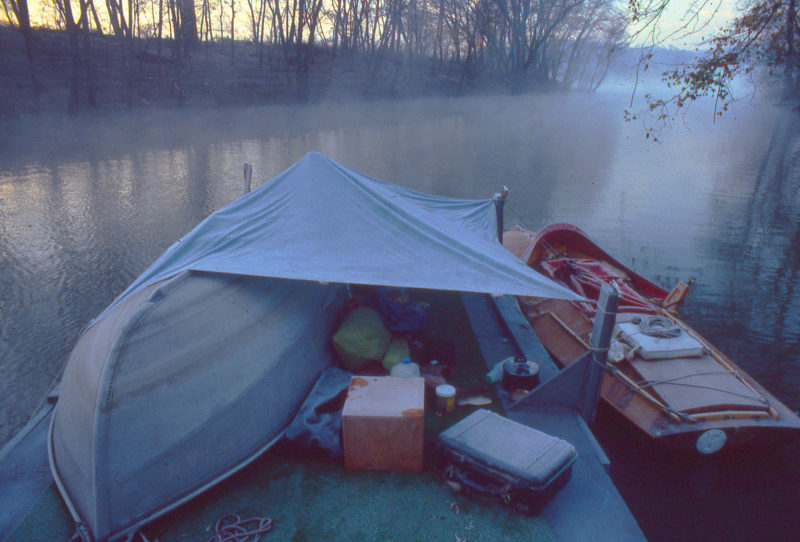
This raft seemed like a good place to spend the night, but it was bitterly cold. I didn’t sleep at all and just waited for dawn when I could row to warm up.
Two years later, when I started a solo rowing trip on the Ohio river in November, the idea was to travel with the leading edge of winter. I had a few cold nights. I stopped at a small marina on the Ohio shore, asking permission to sleep on the dock, and the owner’s son brought me an electric blanket and an extension cord. On my last night on the Ohio River, I dragged my sneakbox into a flooded field and woke the next morning with the boat locked in ice.
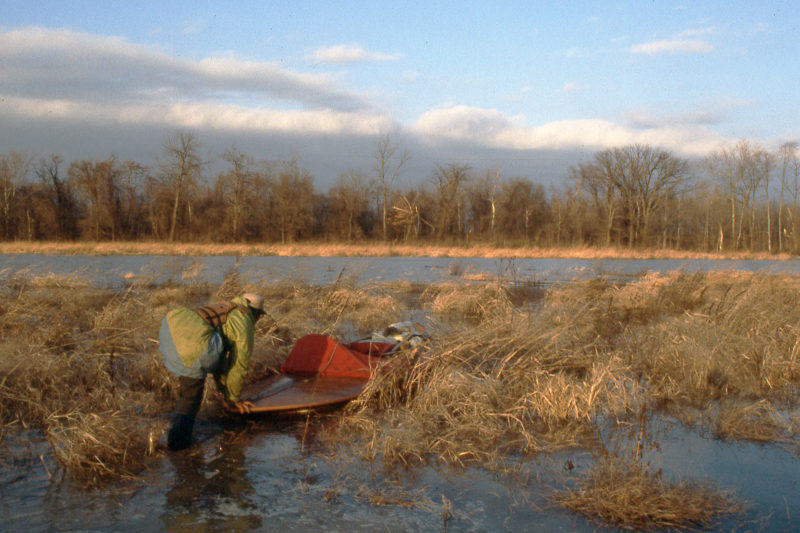
The Ohio River lies just beyond the row of trees, and I had a quiet night in this flooded field. I had slept aboard the boat, protected from the wind and insulated from the cold by the cedar hull and deck. The green and blue cagoule is the one I’d made for snowshoe hiking.
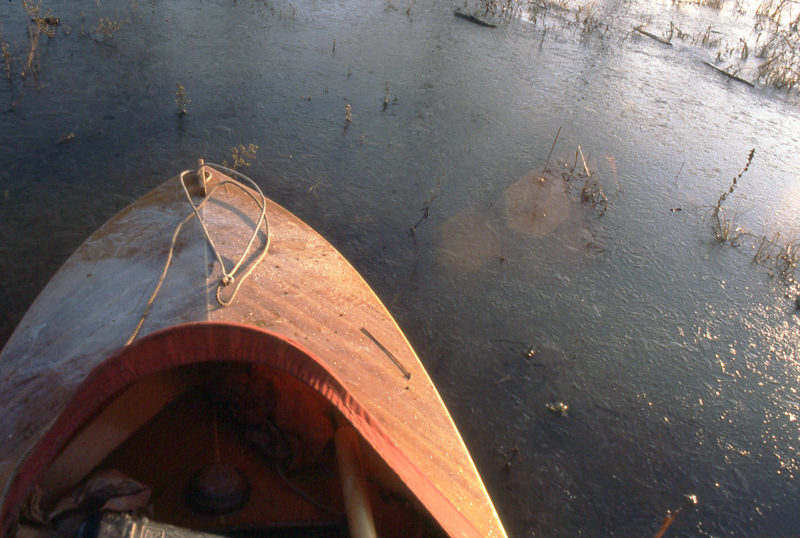
The field (in the photo above) that I’d waded the boat across the evening before, made for a noisy passage in the morning as the layer of ice buckled under the sneak box.
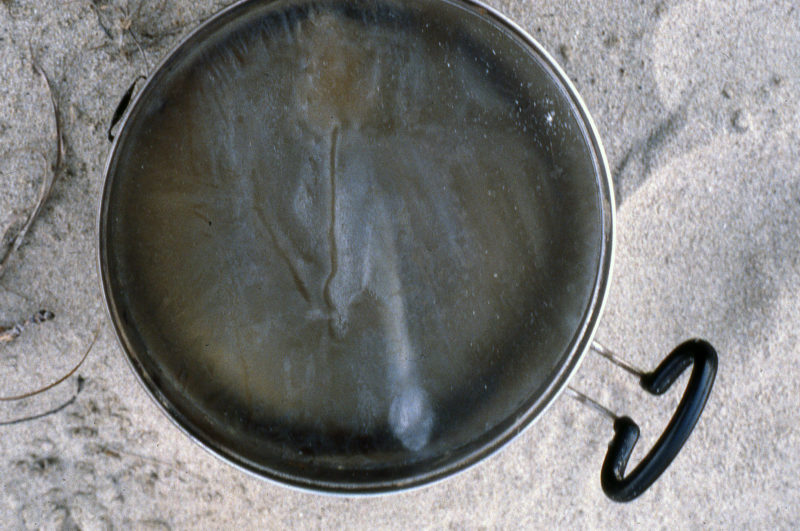
At another camp I had left my cook pot full of water to soak before I washed it. A hard freeze overnight had entombed my spoon in a solid block of ice.
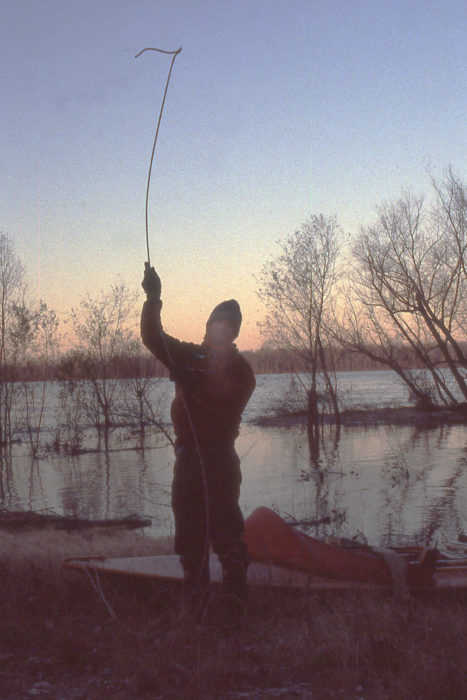
In baseball, blistering line drives and long hard throws from the outfield are called “frozen ropes.” A wet painter, left taut overnight, is the literal version.
The cold caught up with me in earnest on the Mississippi River south of Memphis, Tennessee. A moonless night fell across the river before I was able to find a place to pull ashore. In the dark, carried fast by the current, it was even harder to spot a place to stop. A wind blowing upriver created a chop that splashed over the bow, coating the deck, the dodger, and my jacket with ice. I was aware of the numbness creeping from my hands and feet up my arms and legs. I’d had a run-in with hypothermia once before, and knew I’d be in trouble when the cold hit my core.
The beam of my flashlight picked up a bright patch of sand flanked by stands of dead reeds. I rowed for the sand but the reeds, frozen and coated with ice brought me up short. I had to back up and ram the reeds again to break through. I was racing against time to get a fire started. As I gathered dead wood the cold seeped into my core and I was doubled over and wracked by spasms. It took intense concentration to get the fire lit.
I got through the night, warmed by the fire, hot food, tent and sleeping bag. In the morning I woke up just as the sunlight set my tent aglow. Outside there was a single leafless tree surrounded by fist-sized cobbles. Its shadow, as intricate as a cathedral’s rose window, was white with frost, luminous against the wet black rock.
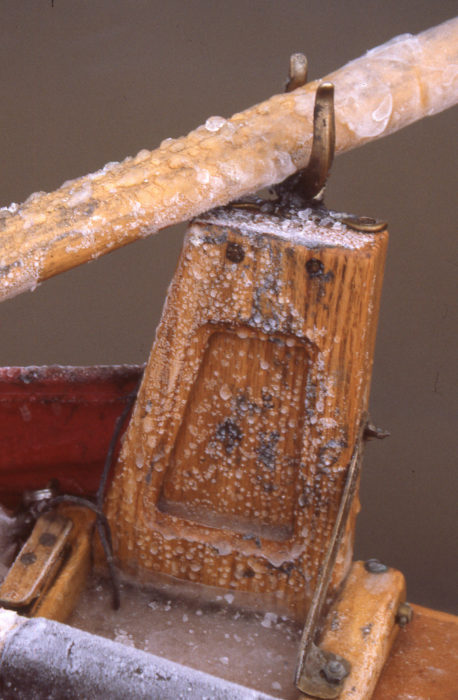
In the morning after that cold night south of Memphis, my boat was coated with ice and frost.
That night on the Mississippi taught me to better respect and prepare for cold, and the morning showed me another beautiful creation of winter, one that can easily go unnoticed.
I am much better equipped now to go boating in winter and can be quite comfortable when the weather turns cold. The frost on the boat in my backyard this morning doesn’t make me happy to be home. It makes me wonder what I’m missing by not being out on the water.![]()

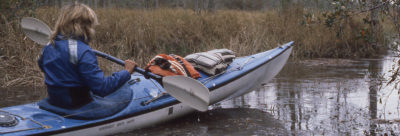
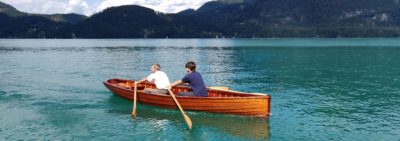
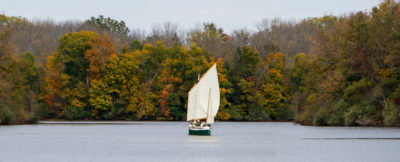
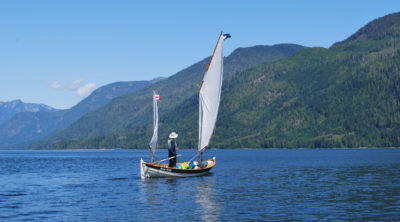
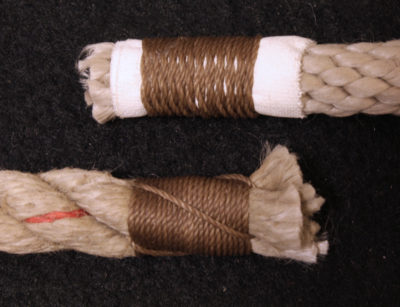
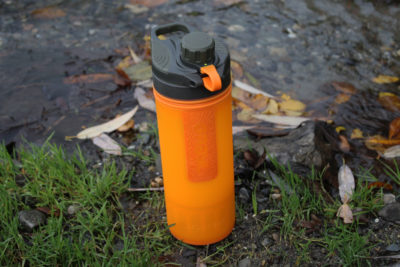
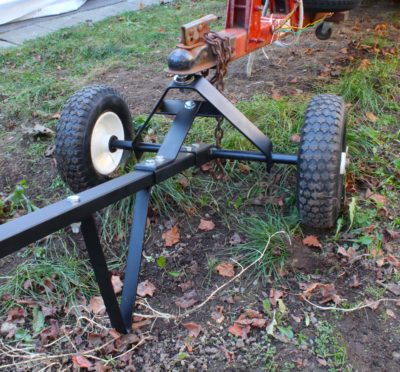
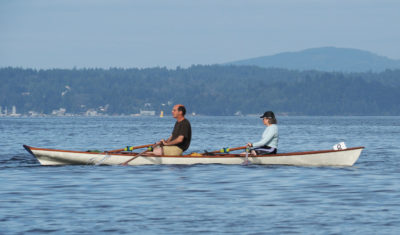

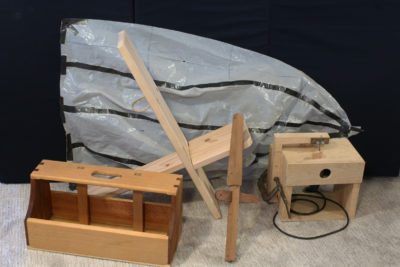
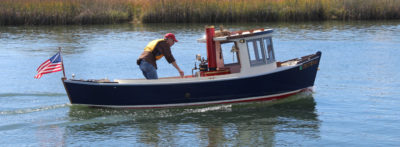
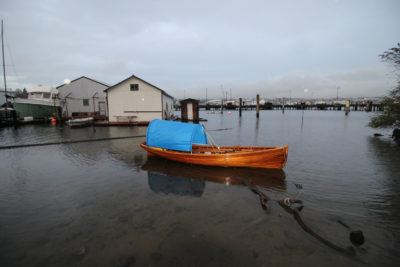
Still rowing in Maine in the winter. Secret is salting the bilge so the precipitation doesn’t freeze solid and you can shovel out the snow or soft ice. Insulated rubber mitts or gloves for bailing then switch to leather mitts with wool underneath for rowing. If you need to break skim ice, an iron-tipped pole. You get great calm days after a storm or when one is brewing.
Very nice article. It brings back memories of growing up in Duluth, MN, where you either embrace the cold or stay inside!
Wonderful stories. Hoping to do more sailing this autumn than I have in the past, in local lakes. Upside is there’ll be only a few to zero motorboats about, upsetting the water. No jet skis or motor boat wakes. On the downside, cold water and the risk of hypothermia if a capsize. Need to acquire & use either a dry suit or wet suit – not really sure which.
Gore Tex dry suit, no question. Ive pulled on enough damp wet suits to know what I don’t want. If you work up a sweat rowing or paddling, the Gore Tex vents the moisture out. Since the effect is to move moisture from the warm to the cold condition, it is even more effective in winter. But wear warming layers underneath. My preferred one is merino wool (plus more layers if it’s really cold).
I have day-paddled on frozen water (Dakota and California creeks in northern Whatcom County, WA). I was concerned the ice might damage my wooden Pygmy kayak, but no problem if the ice isn’t too thick. If your boat slides up onto the ice, your weight will usually break through it.
So glad I stumbled across this article. I thought I was the only one nutty enough to enjoy boating in ice, as compared to “iceboating”. I do enjoy both but with climate change I get fewer chances to do the later, maybe a day every 3 to 5 years here in NW Connecticut.
I have an 18′ Grumman (sorry about the aluminum!) rigged for sailing and rowing. I love breaking ice on lakes and rivers while under oar power.
In spring, exploring the open water around the edges of lakes is great fun. When my kids were small and gullible I’d take them along and follow open leads into the middle of the ice pack. Then push up onto thick ice for an ice picnic. “Pizza-on-Ice Capades” we called it
I had a beat up 15′ Grumman with a lateen rig that I didn’t mind abusing by sailing up on to ice and skittering across to the next open lead. The full-length aluminum keel made it a big, noisy ice skate.
When the wind died, I’d drop the sail, pull the mast out of the step, and use it to pole my way to open water and paddle from there.
I like Daniel’s concept of “embracing the cold.” I taught that to my kids, along with embracing the dark.